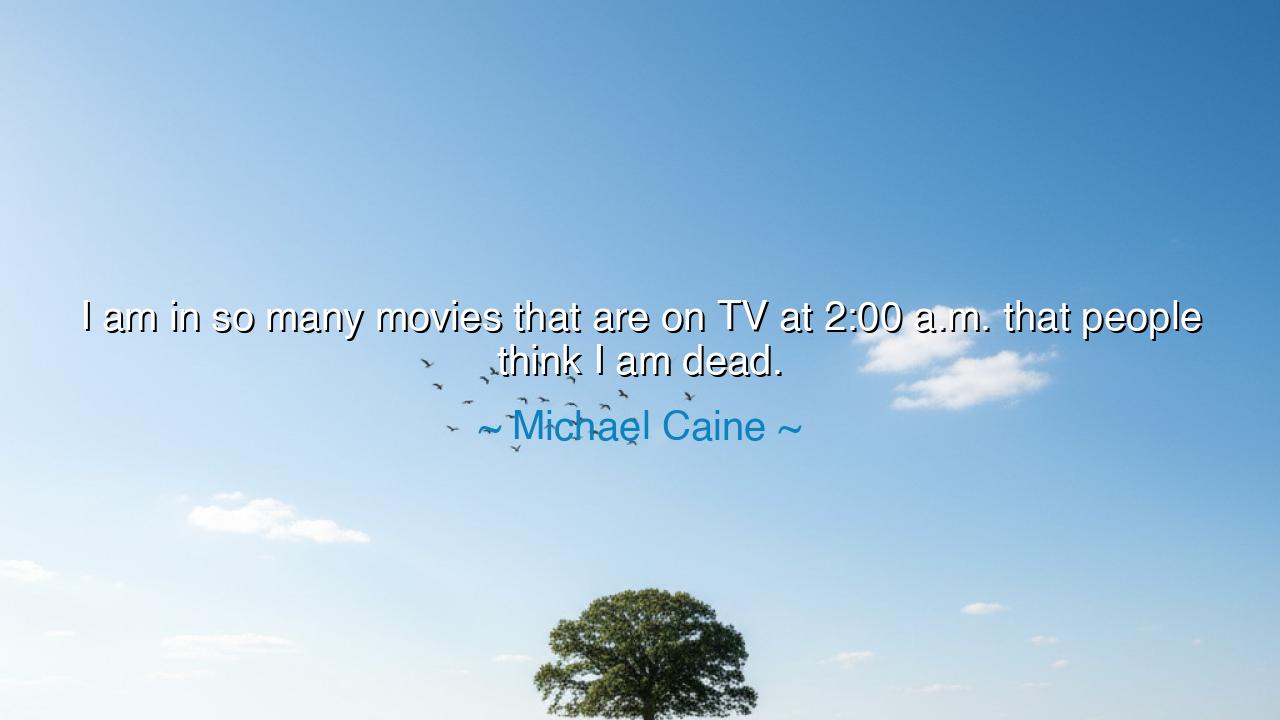
I am in so many movies that are on TV at 2:00 a.m. that people






Listen closely, O Seekers of Wisdom, to the words of Michael Caine, who speaks with both humor and reflection: "I am in so many movies that are on TV at 2:00 a.m. that people think I am dead." In this simple, yet deeply poignant statement, Caine touches upon the paradox of fame, the legacy of an artist, and the fleeting nature of both recognition and time. His words, though wrapped in jest, carry a profound truth about the transient nature of public attention and the strange way in which the world both elevates and forgets. At the heart of his statement lies the reflection that, despite the countless performances that made him a star, there are moments when the world moves on, and an artist's work seems to fade into the background, only to be rediscovered at the oddest of hours.
In the ancient world, the heroes of myth often faced a similar fate. Achilles, though celebrated for his strength and valor in the Iliad, was not destined to be remembered for his noble deeds alone. Instead, his legacy—like that of many heroes—was complicated by time and memory. After his death, his name lived on, but often in fleeting whispers. Similarly, the fame of King Arthur, that once great and mighty ruler, faded into legend, with different versions of his story emerging across time, sometimes more myth than fact. Caine, in a way, reflects the same tension between fame and obscurity. Even the most celebrated of individuals are subject to the passage of time and the fickleness of memory, as the world moves on to the next generation of heroes.
The heart of Caine's statement lies in the recognition that fame is, in itself, an ephemeral thing. How often have we seen the great stars of one era become the shadows of the next? Think of the silent film stars like Charlie Chaplin and Greta Garbo, whose faces once adorned the pages of every magazine but later faded from public consciousness. Their works, though timeless, were often relegated to late-night showings on television, their greatness only revived by the most ardent admirers or the occasional rerun. Caine, much like these great figures of the past, has been part of a vast cinematic landscape, with his face etched into the history of countless films. And yet, just as these films are replayed late at night, there is a haunting sense that the world has moved on, that the artist is no longer fully present in the world’s gaze.
It is this duality of existence—the fleeting nature of fame, the inevitable fading from the public eye—that Caine so humorously reflects upon. In the same way that Plato warned against the fleeting nature of the physical world, he spoke of the eternal truths that persist beyond time and recognition. Caine’s career, which spans decades of cinematic history, is an illustration of how the world may forget the person, yet the work they leave behind endures. The films he has contributed to, and the characters he has portrayed, become timeless not because they are remembered by every person, but because they continue to resonate with those who encounter them, often at the most unexpected moments.
Let this reflection guide us, O Children of the Future: the works we create, whether in film, art, or life, are not defined by the fleeting recognition of the present. Like Caine’s movies, they may be rediscovered at unexpected hours, by those who are open to what we have left behind. The pursuit of fame or acclaim should not be our ultimate goal, for such things are as fleeting as the night. Instead, we should focus on the quality and impact of the work itself, knowing that even if it is forgotten by many, it will live on in the hearts of those who find it and in the legacy we leave behind.
Consider, O Seekers, the story of William Shakespeare, whose plays, though once widely performed, were not always celebrated in his lifetime. It was only in the centuries that followed that his works became universally revered, standing the test of time. Shakespeare did not write for the fleeting recognition of his day; he wrote for something greater, something eternal. In this, we see the lesson: true greatness is not measured by how widely we are recognized in our time, but by the quality of our contributions and the impact they leave long after we have passed.
Therefore, O Children of the Future, take this lesson to heart: create not for the fleeting praise of the moment, but for the lasting impact of your work. Caine, through his humor and reflection, reminds us that the true worth of an artist’s life lies not in the accolades of the present, but in the depth and lasting quality of the work they leave behind. Fame is a passing shadow, but the work—that endures. Let this be the guide of your journey: to create, to live, and to leave behind something that will echo through the ages, no matter how distant the future may seem.






AAdministratorAdministrator
Welcome, honored guests. Please leave a comment, we will respond soon